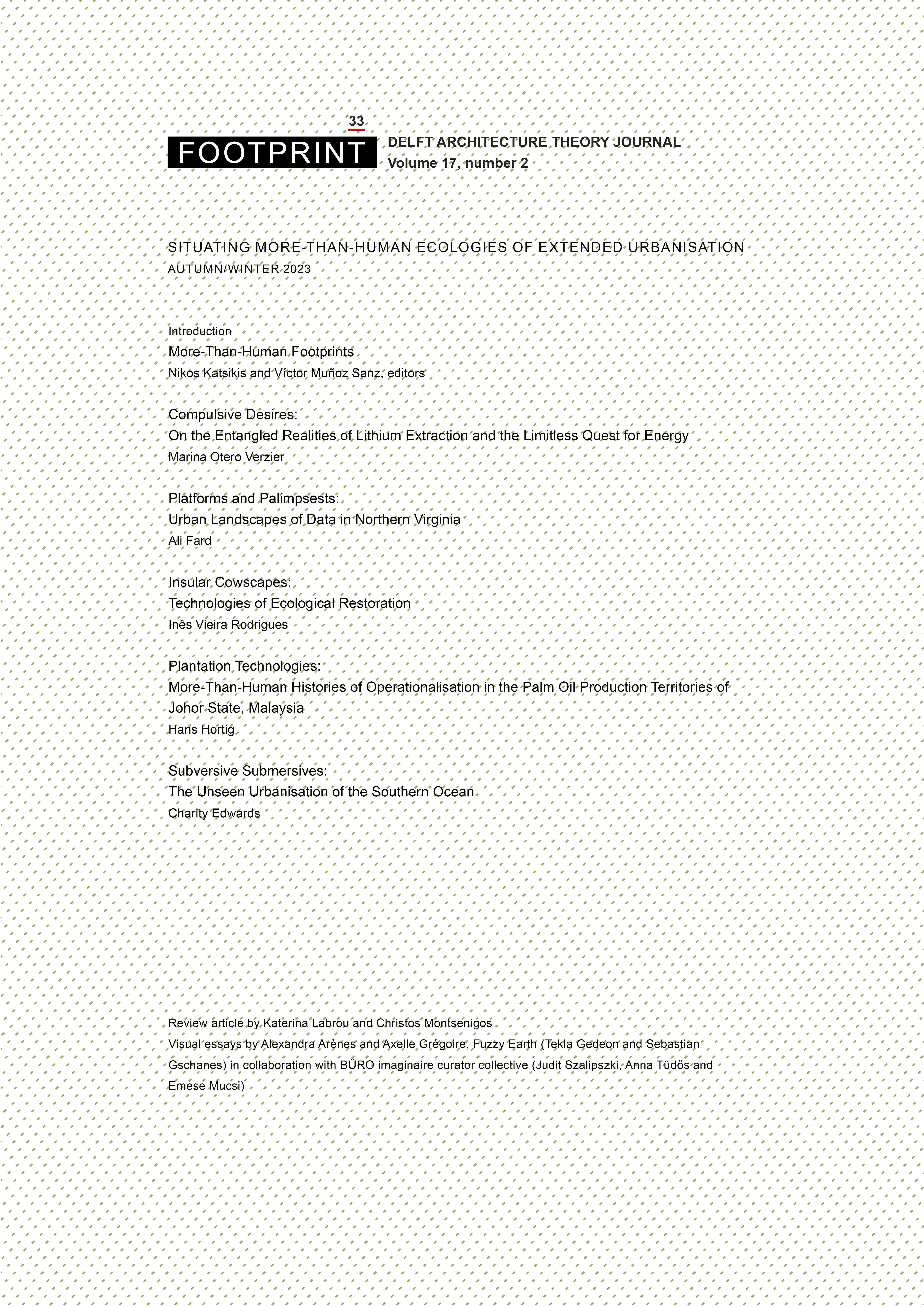More-Than-Human Footprints
DOI:
https://doi.org/10.59490/footprint.17.2.7401Abstract
This issue of Footprint explores techn-natural spatialities and materialities found across operational landscapes of primary production. To the extent that these landscapes are increasingly automated and digitised, production and circulation practices are becoming more capital intensive and even less labour-intensive. While amplifying the precarity of human labour, this process relies on appropriating the work of more-than-human assemblages of machines, plants, animals and microorganisms. Central to the focus of this issue is understanding the way these processes are grounded in specific architectural and landscape configurations. In this way, we also aim to complement the debates on past issues of Footprint, offering an investigation of the impact of technological transformations beyond the concentrated landscapes of human inhabitation.
References
Allam, Zaheer, and Zaynah A. Dhunny. "On Big Data, Artificial Intelligence and Smart Cities." Cities 89 (2019): 80–91.
Angelo, Hillary, and David Wachsmuth. "Urbanizing Urban Political Ecology: A Critique of Methodological Cityism." International Journal of Urban and Regional Research 39, no. 1 (2015): 16–27
Beasley, Nina. "The Small Garden." Gardens Illustrated, March 2018.
Bebbington, Anthony, and Jeffrey Bury, eds. Subterranean Struggles: New Dynamics of Mining, Oil, and Gas in Latin America. Austin: University of Texas Press, 2013.
Bellacasa, Maria Puig de la. Matters of Care: Speculative Ethics in More Than Human Worlds. Minneapolis: University of Minnesota Press, 2017
Braidotti, Rosi. Transpositions: On Nomadic Ethics. Cambridge: Polity Press, 2006.
Brenner, Neil, and Christian Schmid. "Towards a New Epistemology of the Urban?" City 19, no. 2–3 (2015): 151–82.
Brenner, Neil, and Christian Schmid. "Planetary Urbanization." In Urban Constellations, edited by Matthew Gandy, 10–13. Berlin: Jovis, 2011.
Brenner, Neil. Implosions/Explosions: Towards a Study of Planetary Urbanization. Berlin: Jovis, 2014
Brenner, Neil. "Theses on Urbanization." Public Culture 25, no. 1 (2013): 85–114.
Brenner, Neil, and Nikos Katsikis. "Operational Landscapes: Hinterlands of the Capitalocene." Architectural Design 90, no. 1 (2020): 22–31.
Bunker, Stephen G., and Paul S. Ciccantell. "Generative Sectors and the New Historical Materialism: Economic Ascent and the Cumulatively Sequential Restructuring of the World Economy." Studies in Comparative International Development 37 (2003): 3–30.
Demos, T. J. "To Save a World: Geoengineering, Conflictual Futurisms, and the Unthinkable." E-flux journal 94 (2018).
Escobar, Arturo. Territories of Difference: Place, Movements, Life, Redes. Durham, NC: Duke University Press, 2008.
Escobar, Arturo. Designs for the Pluriverse: Radical Interdependence, Autonomy, and the Making of Worlds. Durham, NC: Duke University Press, 2018.
Fetting, Constanze. "The European Green Deal." ESDN report 53 (2020).
Fleming, Billy. "Design and the Green New Deal." Places Journal (April 2019). https://doi.org/10.22269/190416.
Gandy, Matthew. "Cyborg Urbanization: Complexity and Monstrosity in the Contemporary City." International Journal of Urban and Regional Research 29, no. 1 (2005): 26–49.
Ghosn, Rania, and El Hadi Jazairy. The Planet After Geoengineering. Barcelona: Actar Publishers, 2021.
Graeber, David, and David Wengrow. The Dawn of Everything: A New History of Humanity. London: Allen Lane, 2021.
Haraway, Donna J. When Species Meet. Minneapolis: University of Minnesota Press, 2008.
Haraway, Donna J. "Anthropocene, Capitalocene, Plantationocene, Chthulucene: Making Kin." Environmental Humanities 6, no. 1 (2015): 159–65.
Hecht, Susanna B., Kathleen D. Morrison, and Christine Padoch, eds. The Social Lives of Forests: Past, Present, and Future of Woodland Resurgence. Chicago: University of Chicago Press, 2014.
Hensel, Michael U. "The Rights to Ground: Integrating Human and Non‐Human Perspectives in an Inclusive Approach to Sustainability." Sustainable Development 27, no. 2 (2019): 245–51.
Jacobs, Jane. The Economy of Cities. London: Vintage, 2016 [1969].
Katsikis, Nikos, Neil Brenner, and Swarnabh Ghosh. "The Global Industrial Feedlot Matrix: A Metabolic Monstrosity." In Technical Lands: A Critical Primer, edited by Jeffrey S. Nesbit and Charles Waldheim, 132–55. Berlin: Jovis Verlag, 2022.
Patel, Raj, and Jason W. Moore. A History of the World in Seven Cheap Things: A Guide to Capitalism, Nature, and the Future of the Planet. Oakland: University of California Press, 2017.
Schrepfer, Susan, and Philip Scranton, eds. Industrializing Organisms: Introducing Evolutionary History. New York: Routledge, 2003.
Shiva, Vandana. Monocultures of the Mind: Perspectives on Biodiversity and Biotechnology. London: Zed Books, 1993.
Tsing, Anna Lowenhaupt. Friction: An Ethnography of Global Connection. Princeton: Princeton University Press, 2005.
Tsing, Anna Lowenhaupt et al., eds. Feral Atlas: The More-Than-Human Anthropocene. Redwood City: Stanford University Press, 2021.
Tsing, Anna Lowenhaupt, Andrew S. Mathews, and Nils Bubandt. "Patchy Anthropocene: Landscape Structure, Multispecies History, and the Retooling of Anthropology." Current Anthropology 60, supplement 20 (2019): 186–97.
Tzaninis, Yannis et al. "Moving Urban Political Ecology Beyond the 'Urbanization Of Nature'." Progress in Human Geography 45, no. 2 (2021): 229–52.
Viviano, Frank. "How the Netherlands Feeds the World." National Geographic, September 2017. https://www.nationalgeographic.com/magazine/article/holland-agriculture-sustainable-farming.
White, Damian, and Chris Wilbert. "Introduction: Technonatural Time-Spaces." Science as Culture 15, no. 2 (2006): 95–104. http://doi.org/10.1080/09505430600707921.
Young, Liam. "Neo-machine: Architecture Without People." Architectural Design 89, no. 1 (2019): 6–13. http://doi.org/10.1002/ad.2381.
Downloads
Published
Issue
Section
License
Copyright (c) 2024 Victor Muñoz Sanz, Nikos Katsikis

This work is licensed under a Creative Commons Attribution 4.0 International License.
- Authors retain copyright and grant the journal right of first publication with the work simultaneously licensed under a Creative Commons Attribution License that allows others to share the work with an acknowledgement of the work's authorship and initial publication in this journal.
- Authors are able to enter into separate, additional contractual arrangements for the non-exclusive distribution of the journal's published version of the work (e.g., post it to an institutional repository or publish it in a book), with an acknowledgement of its initial publication in this journal.





